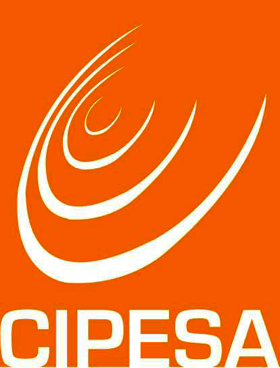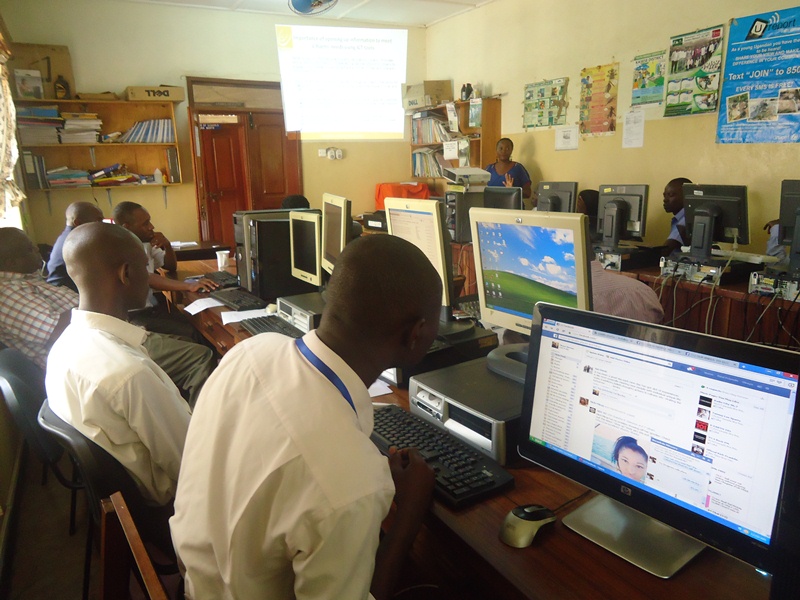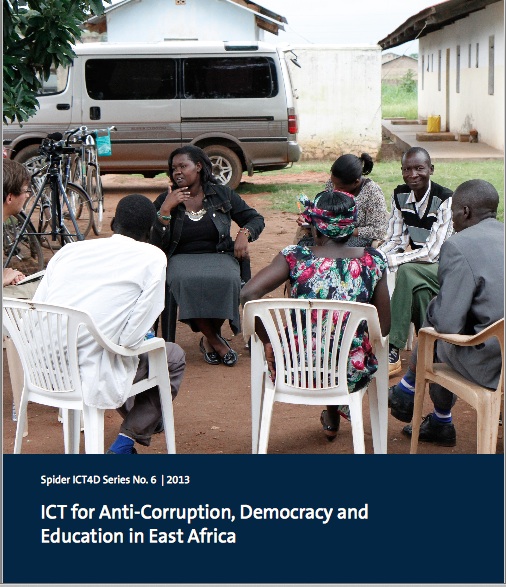The Collaboration on International ICT Policy in East and Southern Africa (CIPESA) is seeking Consultants to study how current Information and Communications Technologies (ICT)-related policies and practices affect democratic governance in Kenya, Tanzania and Uganda.
Closing date for applications: Monday April 28, 2014.
Further details on scope, requirements and how to apply are available here.
Local leaders in Kasese District Trained in e-Governance
This month, the Collaboration on International ICT Policy in East and Southern Africa (CIPESA) and the E-Society Resource Centre Kasese trained local leaders in Kasese district in the use of ICTs for improved governance and service delivery. During the March 20-21 2014 workshop, local leaders of the western Uganda district were also trained in using ICTs for information sharing and promoting citizen participation.
Speaking at the workshop, District Information Officer John Thawite urged local leaders to break away from the culture of secrecy and work in accordance with the 2005 Uganda Access to Information Act. “Meaningful participation in democratic processes requires informed participants hence the need for increased access to information,” he said.
However, Mr. Thawite noted some challenges to better access to information: poor facilitation for information officers, lack of ICT tools to process information requests, the Official Secrets Act of 1964 which bars public servants from releasing certain information, and poor coordination of information systems between departments.
During introductory sessions, participants were introduced to the basic elements of computer use, the internet and information security. Later, they were introduced to the concept of e-governance and its role in improving service delivery. The training included an interaction with the district e-government tools such as the district portal (www.kasese.go.ug), district discussion group (https://dgroups.org/iicd/kasese), E-library for district e-resources (https://elibrary.kasese.go.ug) and the district news portal (https://kasesenews.blogspot.com/).
The workshop also sought to enhance the leaders’ capability to engage with citizens through social media, and illustrated how this engagement could contribute to improved services delivery. According to Alexa.com, Facebook, Twitter, blog post and youtube are among the top ten accessed websites in Uganda and their potential in catalysing citizen participation in governance was emphasised.
Leaders were further encouraged to use the Rwenzururu facebook group (https://www.facebook.com/groups/nokasesesplit/) created in 2012 by community members in Kasese during a CIPESA citizen journalism training to discuss prevailing issues in the region..
Participants welcomed the training with one saying that he would henceforth be able to get access more information about various operations of the government through the various e-governance platforms shared. Another participant asked the e-society Resource Centre to work with heads of departments so that they always send their budgets, minutes of meetings, work plans and other communication to the e-platforms.
CIPESA has since 2011 spearheaded the iParticipate Uganda project. Through grassroots based ICT access centres in Eastern, Western and Northern Uganda, CIPESA creates awareness and builds the capacity and skills of citizens, media and local government to leverage ICTs to catalyse civic participation, democracy monitoring and access to information in Uganda. The E-society Resource Center Kasese is CIPESA’s western region partner. The centre provides support, promotes ICT literacy and the use of ICT for transparency in the Kasese local government.
Article complied by Mr. Samuel Mumbere – E-Society Resource Centre Kasese and Ms. Lillian Nalwoga – CIPESA
AfricaICTResearch.org: New Portal on ICTs, State and Peace Building Research in Africa
Although the use of Information and Communication Technologies by citizens and governments in Africa is growing exponentially, there is limited evidence of how these technologies are affecting statebuilding and peace building on the continent. Where such evidence exists, it is often in diverse locations and hard to reach for researchers, practitioners, the media and government bodies.
In order to increase access to information on ICTs in Africa, the Centre for Global Communications Studies (CGCS) at the University of Pennsylvania has launched a new website that offers news and updates on research and events related to ICTs, peace building and governance. The portal features a repository of reports and articles with empirical evidence on the role of ICTs in peace building and governance.
In addition, the website offers access to articles typically blocked by journal paywalls by obtaining pre-print versions of articles from authors.
As a partner in CGCS’s project titled “Reframing Local Knowledge: ICTs, State building, and Peace building in Eastern Africa”, CIPESA undertook a review of literature on the role of ICTs in governance, peace-building and state-building in Africa, with a focus on three neighbouring countries: Ethiopia, Kenya, and Somalia.
An increasing number of Africa’s estimated one billion people are accessing modern communication technologies. According to the International Telecommunications Union, as of 2013, internet penetration stood at 16% and mobile access at 63% of Africa’s population.
It follows that online service provision, placing a wide array of information in the public domain, an empowered citizenry that holds leaders to account and smartly embrace ICT, could potentially catalyse peace, democracy and good governance in Africa.
There is a considerable amount of research by scholars, government agencies, civil society, development partners and many more on the use of ICTs in governance in Africa, covering a broad range of definitions and dimensions. A central place to find this research has hitherto been lacking, which is why scholars, practitioners and public officials will find the new portal a vital resource.
The work for the project is being carried out in collaboration with the Programme in Comparative Media Law and Policy (PCMLP) at the University of Oxford, the Centre for Intellectual Property and Information Technology at Strathmore University (Kenya), the School of Journalism and Communication at Addis Ababa University (Ethiopia), CIPESA, The Heritage Institute for Policy Studies and SIMAD University (Somalia).
Read more about the project here.
Video: Introduction to eSociety Kasese
Located in Western Uganda, eSociety Kasese is a resource centre that promotes ICT literacy and the use of ICT for transparency in the local government. As part of its iParticipate Uganda project, the Collaboration on International ICT Policy for East and Southern Africa (CIPESA) has provided to the centre equipment and connectivity support. In addition, we jointly conduct research and citizen journalism training.
Below is an introductory video to the Centre.
[youtube]http://www.youtube.com/watch?v=0gHmetwCgfo[/youtube]
New Spider Research Publication on ICT4D in East Africa
The publication “ICT for Anti-corruption, Democracy and Education in East Africa” is the first product of the Swedish Programme for ICT in Developing Region (Spider)’s Research Related to Projects initiative which was devised and first implemented in 2012.
Connecting research directly to Spider supported projects aims to establish a closer connection between ICT4D research and ICT4D practice. The support allows ICT4D researchers in Sweden, in collaboration with researchers and practitioners in partner countries, to carry out research on ongoing ICT4D projects. This has generated research that can contribute more directly to development work, and provide a substantial contribution to poverty reduction and other development goals. The publication covers three thematic areas: anti-corruption, democracy and education. The six contributions span from ethnographic descriptions and analyses to explorations of collaborative design and evaluation of the achievement of set capacity building goals from the capability approach.
The volume is edited by Dr Katja Sarajeva, Program Manager at Spider.
Download the publication here.





